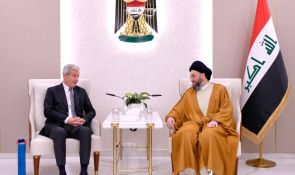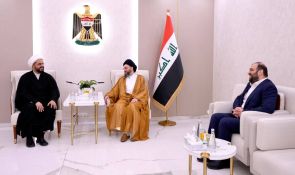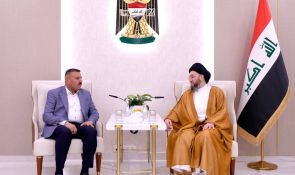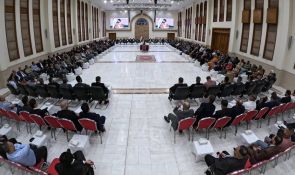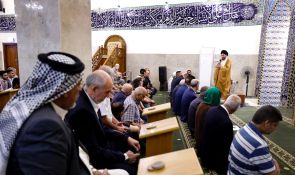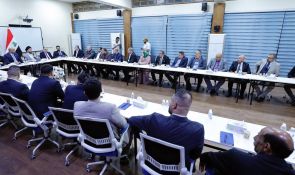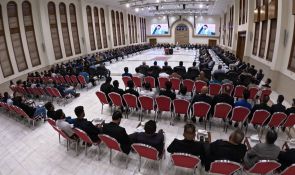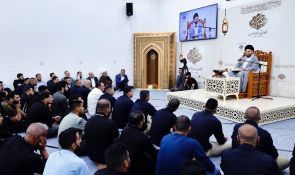TEXT OF THE SPEECH OF HIS HOLINESS SAYYID AMMAR AL-HAKIM IN THE CELEBRATION OF AL-ZAHRAA’S BIRTH ANNIVERSARY AND ON IRAQI WOMAN’S DAY
In the Name of Allah, the most Gracious, the most Merciful. We have granted the fount (of abundance) to you. Therefore turn to your Lord in prayers, and (offer) sacrifice. For he who hates you will be cut off (from Allah’s mercy).
Peace with Fatima, her father, husband, offspring the mystery entrusted in her. Peace with the Leader of the Women of the World, the truthful, the pure, the righteous, the great, the blessed one. Peace with al-Zahraa the day she was born, the day she sacrificed, the day she offered a great deal and the day she departed as an oppressed martyr.
What can we say about Fatima on this sacred ay, on this happy day? We bring to memory a model of the perfect man. We bring to memory a role model before which we stand in humility before her perfection. We bring to memory a mountain, a symbol, a peak of humanity. Al-Zahraa cannot be summed up in a sect, nor can she be summed up in a creed; she is humanity as a whole; she cannot be summed up in a gender, in the gender of woman, nor can she be a role model only for women. She is a role model for men, women and mankind, all mankind. Al-Zahraa is the peak of humbleness. Al-Zahraa is the peak of perfection. Allah, the Praised and the Exalted One, wanted through her that such should be the status of woman, such is the status of woman, such are the opportunities for the perfection anticipated for woman. For perfection does not stand at a limit. Perfection cannot be summed up in a gender, even it if may be the position of Divine infallibility and the purification of perfection with which Allah, the most Praised and Exalted One, blessed four perfect women: Mary daughter of Imran (Amram), the pure woman whom the Qur’an describes with the best of qualities, Asia daughter of Muzahim, wife of Pharaoh, as if Allah, Praise and Exaltation belong to Him, wanted to provide us with a moral in how tyrants and their tyranny cannot prevent perfection, not even if it may be inside their own home, inside their own family; so, what would you say about the society? This woman took care of Moses son of Imran, peace with him and with our Prophet and his Progeny. Add to them Khadija daughter of Khuwaylid, wife of the Prophet (Õ), and Fatima (Ú). Three ladies were leaders of their world, whereas Fatima is the Leader of all Women of the World. When we notice such purity in these four women, we find them vessels of great prophets, or they were in a position of looking after great prophets, which means that being close to a great person brings about greatness, and that behind every great man there is a great woman even if he may be a prophet. These are lessons of life. They are the illuminating signals which Allah, Praise and Exaltation are His, releases for man so he may learn, delve deeply, see and effect justice. How we nowadays need justice to be effected to woman, how we need to know the essence of woman, the status of woman, the lofty status of woman!
Our good sisters, it is a great day on which we remember Lady al-Zahraa (Ú) who was the link between Prophethood and Imamate: Her father is the Chosen One (Õ), her husband is the pleased wasi, and her sons are the Infallible Imams (Ú), so she was the connection, the link between the Messenger of Allah (Õ) and the angelic world. What does the Messenger of Allah (Õ) say?! “Whenever I was eager for Paradise, I would kiss Fatima’s neck.” She, then, was the link between the Messenger of Allah (Õ) and those great stations. Al-Zahraa, the lady of virtue, represented the zenith of role models for woman in all her roles: the woman as a daughter, so she was the “mother of her father,” the woman as the wife, and great testimonies have been cited from Ali (Ú), and the women as a mother. She was loyal, and she was caretaker and the woman who raised al-Hassan and al-Hussain (Ú) and her other children. What doe the Messenger of Allah (Õ) say in describing her? “Allah filled the heart of my daughter Fatima and senses with faith and conviction,” a status of being filled with faith and conviction which is much deeper than belief. It leads to a status of clarity and revelation when the truth becomes clear in its full dimensions before man. Fatima was full of faith and conviction according to the testimony of the Messenger of Allah (Õ). Testifying for her, Ali (Ú) says to bear witness for her being a good wife: “She never made me angry.” Nine years passed of marriage life between Ali and Fatima (Ú), yet Ali (Ú) was never angry with Fatima not even for one day. “Nor disobey she disobey me.” A status of harmony, understanding and fulfillment of obligations and tasks: “Whenever I looked at her, all my worries and concerns would dissipate.” She was contented, and she was patient, so much so that the Messenger of Allah (Õ) felt sorry for her condition as a result of the predicament caused by her tough circumstances. One day he (Õ) spoke to her frankly: “O daughter! Hasten to replace life’s bitterness with the hereafter’s sweetness.” Allah, the most Praised and Exalted, does not combine life and the hereafter together. If you want the sweetness of the hereafter, you have to tolerate the bitterness of life. One who lives in ease and absolute relaxation must have doubts about his condition in the hereafter. This life is one of trials; man must be fully tested and must face life. He must face the challenges till he secures that abode, that creation. He (Õ) used to entertain her with the thought that this bitterness of this life will be followed by sweetness. He (Õ) used to offer her comfort in this regard. But what was the comment of Lady al-Zahraa about this statement? She said, “O Messenger of Allah! Praise belongs to Allah and thanks for His blessings.” Al-Zahraa is grateful, praising her Lord, accepting her conditions, understanding and in harmony even with the trials and tribulations. Such is faith, such is conviction, and these are the perfections which must be available in all of us. When we make a stand at al-Zahraa (Ú), we have to remember woman and her role according to Islam’s outlook, and we must know that Islam gave woman a big push forward in her role, in her missions, in her rights, in her duties, in the opportunities which it awarded her for defending her dignity, personality, liberty and rights. But we are unfair to woman, and by doing so we become unfair to Islam when we read Islam erroneously, an empty reading, a primitive one. She is the beginning, the area for education, upbringing and building. She is half the society. In her laps the other half is raised. So, she is the society in its entirety, the foundation for the family, and the family is the foundation for the society, while the society is the foundation of nations. Woman is the beginning. One who talks about a true development and a true reform must start with woman so the roles may complete each other and go within their right processes.
Iraqi woman has been, like woman in the region and the world, is oppressed on more than one level. If she does not give birth, she is blamed, as if she is the reason behind it. And if she delivers a daughter rather than a son, anger is poured on her, as if she is the one responsible for the nature of her newborn. She is oppressed in her father, husband, brother and son when they are exposed to a predicament, so she lives the predicament with them. If one of them is oppressed, jailed, his right is taken away from him, killed or besieged…, she is oppressed. If he is an oppressor, a blood-shedder, a jailer, she, too, becomes his victim. She is the victim in all circumstances. She has no choice except to bear these consequences, these predicaments, these pains. She is also oppressed when her dignity is abused, when her rights are abused, when her personality is abused as well as her sanctities. She is abused when her circumstances are not observed. Quite often, we find such violations in our reality. I have recently become familiar with an opinion questionnaire undertaken in an Iraqi governorate which was completed at the end of the month of March of this year. I do not wish to mention the said governorate due to its particularity. I think it is the expression of an Iraqi committee which can be witnessed by the Iraqi woman in all governorates. In this questionnaire, 2,500 female specimens and 500 male specimens point out to violence towards woman. According to this questionnaire, there are as many as 86% of cases of violence towards women, including verbal abuse, beating and even excessive beating. Some of them are violations of rights and confiscation of properties, up to the end of a lengthy list of violations and violence. Had it not been 86%, had it been seventy, sixty, fifty or forty percent, the rate remains to be very high and deserves a resounding shout, a true stand, a swift relief effort in support of the Iraqi woman. Whenever I tour some areas, and when there is talk about the family by some men who mention their wives, they say, “Sir, Allah raises your status…,” I say, “Why do you say that? Woman is a fragrant flower, not a source of grief.” The Messenger of Allah (Õ) recommends honoring woman and giving her the right status, regarding this as one of the basics. On this day, the Day of Iraqi Woman, the day of the birth anniversary of al-Zahraa (Ú), allow me to present several recommendations:
1. It is necessary to safeguard the achievements which woman earned politically, socially and economically since 2003 and up to now. Ten years have passed as we all work hard, all the sincere ones, everyone who believes in woman’s role to be in the vanguard. We support her. Gains have been realized. Achievements must be safeguarded and accumulated. We must not abandon what has been achieved. This is an important point. Some atmospheres, measures and processes give the impression that there is a tone that has started escalating, that woman took more than she deserves and we have to go back to what they believe to be the normal status, whereas what has been achieved may be less than what woman deserves in some fields.
2.There is need for coining legislations and laws that serve woman and remove the obstacles before woman’s setting out in various areas. Woman bears an important role. Woman’s ministry bears an important role in monitoring these problems which need certain legislations. We have to go together, ladies of the parliament in the vanguard, to remove some obstacles and to legislate some of what woman needs to ensure her rights.
3.There is need to look after the segment of woman who have lost their bread earners, widows, divorces and battered unwed women in addition to other women who need special care. This requires suitable legislations and laws. It requires monitoring budgets. It requires making plans about how to deal with this phenomenon and alleviate the burdens of women who have none to look after them.
4.There is need to develop social care institutions so they will not be confined to financial support, as little as it is, but they need to build, educate and culture, to prepare and develop women’s energies and capabilities so they may assume their opportunities in administering social affairs.
5.Opportunities must be secured so women may assume the various positions, be they political, civilian, social or cultural, each position harmonizing with woman’s reality and conditions. Woman must have the right to assume this position without discrimination as may in some cases take place.
6.Governmental, civilian and media institutions, as well as anyone who have a heard voice, must bear the responsibility for launching educational and awareness campaigns about woman’s rights. Iraqi woman is unfamiliar with many of her rights. She does not know these rights, so she does not demand them. We, therefore, need awareness in this field.
7.Countryside woman must be looked after. She is exposed to twice the violence, twice the deprivation, and she is further from knowing her rights and entitlements than urban woman. This requires special monitoring and care. It requires ensuring the rights of the countryside woman in the education, health and other fields.
8.There is need for legislating and executing laws that incriminate violence against woman. Nowadays, it is not enough for violence against woman to be faced by only advice and guidance. Not everyone takes advice, so violence against woman must be regarded as a crime punishable by law. If we need legislations, we have to go to legislate such laws, then we work to execute these laws so woman may feel that there is security, there is protection by the law and legal institutions for her rights.
9.There must be a woman’s literacy policy. I am sorry to say that questionnaires, available figures and statistics point out to the largest percentage of illiteracy exists in this group. Special effort and work should be exerted so woman may learn and become capable of assuming her area. Also, an opportunity must be provided for appropriate health care.
10.There must be work towards lowering unemployment rates for women who are willing to work. Also, these indications are much higher than they are for men in our homeland, and this issue deserves a stop at it.
The political reality which we live, the tension, the convulsed statements, the partners speaking ill of each other…, force us to ask: What is the solution? Can one group bear the full responsibility whereas the other group or others relinquish their responsibilities? The answer is: No. We all bear our responsibility. We all must be keen about getting out of this political predicament and out of this standing crisis. Tension, speaking ill of each other, abusing each other, creating atmospheres that do not let the citizens feel comfortable… are not exemplary for building a stable, independent and prosperous Iraq as we wish and want. I think that five steps, if implemented, and they are at hand, can significantly change this scene:
1.Upholding the constitution, the whole constitution, all of it and not some of it. If one of us puts his hand on a constitutional article and says, “This is the constitution!”, this is not the constitution but a portion of it. The nature of the constitution is that it has articles that may serve this side and others that serve another, while a third serve… This is so because it is the constitution of all Iraqis. Accepting part of it while neglecting the other part, focusing on some of its articles while neglecting the others, is not commitment to the constitution. Rather, the constitution is one reality, one complete unit: You may either take it all or leave it all. You may accept it all or we neglect and chop pieces of it to accept. This is like the prayers: One prays, and examples are made and not used as a criterion. One reaches the fourth bowing down, so he feels thirsty and tells himself that he would go to drink some water then return. This nullifies the prayer because it is complete with four such bowing down. This is a complete reality without any discrimination, without politicizing, that we should all accept the constitution in its entirety. There are consensuses that are in harmony with the constitution. The constitution does not talk about details but puts forth the general labels. There are many details that are connected to agreements and understandings in dealing with these matters. These agreements must be respected, for they are the mark of the believers, of the contractors, of those who honor their work when making one, so they commit themselves to it. Every agreement made on the basis of the constitution and is in harmony with it, not contradicting it, must be fulfilled so we will have put forth a clear vision, a yardstick, to solve many problems and remove confusion.
2.Belief by all groups, without any exception, in a true partnership, a partnership in which there are rights and obligations, so we cannot demand the rights while not submitting commitments. They are entitlements for this partnership and we cannot give the rights of this partnership in administering the country. In the destiny-making basic decisions, this partnership must be present.
3.Political calming down: We need to lower our tone, be gentle to each other. Screaming does not serve. We need to calm. We need to mitigate each other. We need feelings that settle and calm down so we may be able to hold a dialogue, to offer treatments. Escalation does not serve anyone. Speaking ill of each other does not serve anyone’s interest. Our interest, all of us, is to live a status of stability and calm in managing the affairs.
4.Constructive political dialogue: We need a true dialogue, one of the braves. Everyone must sit at the table and admit his being a brother of the other. Everyone has criticisms towards his partners. Everyone has remarks, criticism, remonstration, exchanged remonstration, and he has the right to present his remarks, and the other side has the right to listen to the remarks of the other side. Thus should be the affairs. Just as you indict others, so shall you be indicted. This is the logic; so, who goes to debate to take but not to give? He cannot be a debater. This is not the way to debate. We must go while we all are prepared to give to the other side and to take what belongs to him from the other. This is the principle which can treat confusions.
5.Trust building: Trust is a psychological, immaterial, status for which we cannot record certain points. I trust the other, and the other trusts me. This needs a sense of truthfulness: each of us reads in the other’s eyes that he came with the desire for a solution. We will then find the solutions near and possible. We need this mutual trust so we may be one work team, and so we may be one group. Let us go to the national meeting without condition but within these criteria, not these conditions. They are criteria for success. These are the restrictions and the desired subjective frameworks so achieve can be the lot of the national meeting. Let us go to that meeting, and let us sit and hold a dialogue of the braves based on these principles. We will then find the solutions closer to close. I personally feel optimistic that we can tackle our country’s problems when we have the will to be committed to these five principles.


